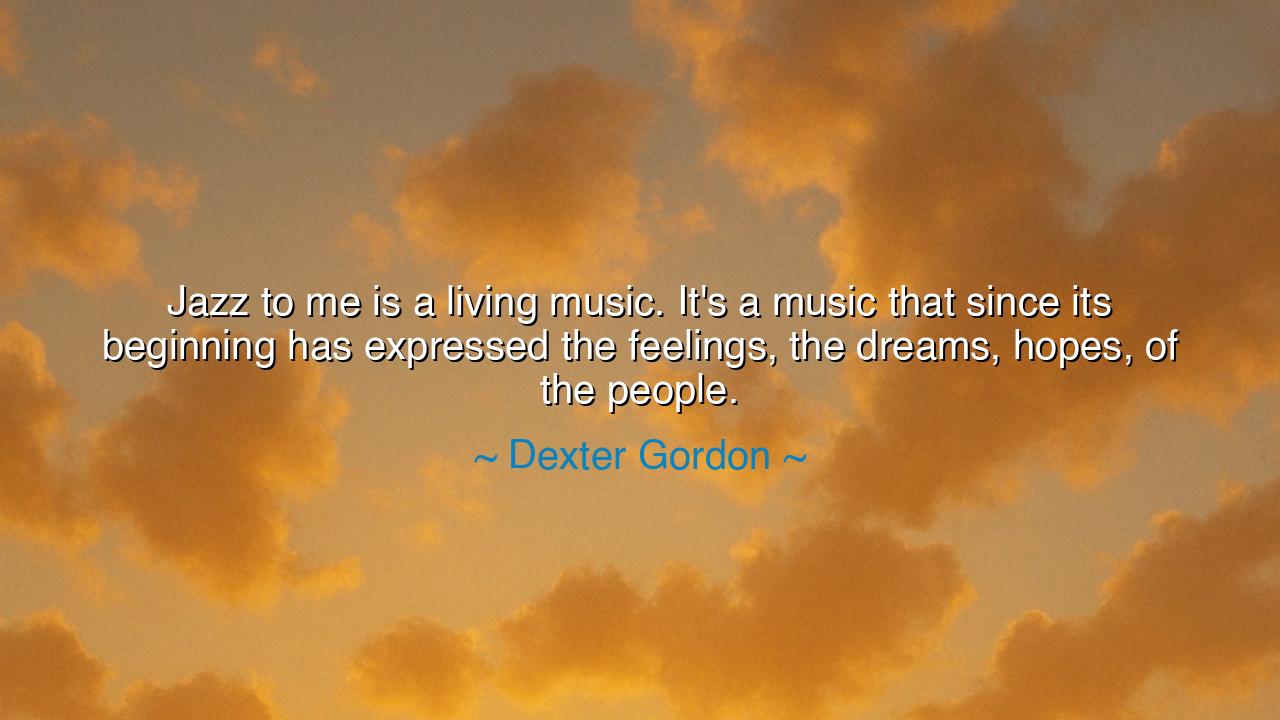
Jazz to me is a living music. It's a music that since its
Jazz to me is a living music. It's a music that since its beginning has expressed the feelings, the dreams, hopes, of the people.






“Jazz to me is a living music. It’s a music that since its beginning has expressed the feelings, the dreams, hopes, of the people.” Thus spoke Dexter Gordon, a master of tone and truth. In these few words, he breathed life into the soul of jazz, calling it not merely a sound, but a living force, a river that flows through time, carrying the pulse of the human spirit. To call music “living” is to say that it changes, grows, breathes — that it bears witness to the struggles and triumphs of those who create it. It is not carved in marble nor confined to the notes on a page; it moves as the people move, weeping when they weep, dancing when they rejoice.
From its origin in the heart of suffering, jazz arose like a phoenix from the ashes of oppression. Born from the cries of enslaved Africans and the laments of the weary worker, it was shaped in the crucible of sorrow yet infused with the flame of endurance. The blues — the mother of jazz — gave voice to pain, but also to resilience. In the smoky bars of New Orleans, where horns and drums met the heartbeat of the people, something eternal began. Jazz did not seek perfection; it sought truth, and in that truth lay its immortality.
To hear jazz is to hear freedom. Its improvisations mirror the journey of a soul breaking free from chains, daring to invent itself anew with each note. In every solo, the player declares, “I am here. I exist. I feel.” This is why Dexter Gordon, standing tall with his tenor sax, spoke not only as a musician but as a messenger. He understood that jazz is not a monument but a movement — a living dialogue between heart and instrument, between the past and the future.
Consider the story of Louis Armstrong, who rose from the poverty of New Orleans to become one of the greatest voices in history. His trumpet did not speak of privilege, but of perseverance. When he played “What a Wonderful World,” it was not naïve hope he offered, but defiant beauty — the insistence that even amid hardship, the human heart can still sing. In his smile, in his music, lived the unbroken dream of a people who refused to surrender their joy.
And so jazz became the echo of the human condition. In the hands of Miles Davis, it whispered of cool introspection. In John Coltrane, it reached toward the divine, seeking a higher truth. Each generation reshaped it, breathed into it new life, for as long as there are hearts to feel and voices to rise, jazz will continue to evolve. It will forever be the sound of becoming — of people finding themselves anew in every age.
The lesson is clear: to live is to improvise. We, too, are composers in the symphony of existence. Life will hand us themes of sorrow and joy, but it is our courage to create — to turn discord into harmony — that defines us. Just as the jazz musician listens deeply, responding to what is and imagining what could be, so must we live attentively, boldly, with grace and spontaneity.
Let each of us, then, take up our own instrument — whether it be words, deeds, or dreams — and play our part in the eternal rhythm. Let us remember that our lives are living music, meant not for silence but for expression. Be true to your inner song, for within it lies your history, your hope, your humanity.
For as Dexter Gordon taught, jazz lives because we live — and so long as we dare to feel, to dream, to hope, the music will never die.






AAdministratorAdministrator
Welcome, honored guests. Please leave a comment, we will respond soon